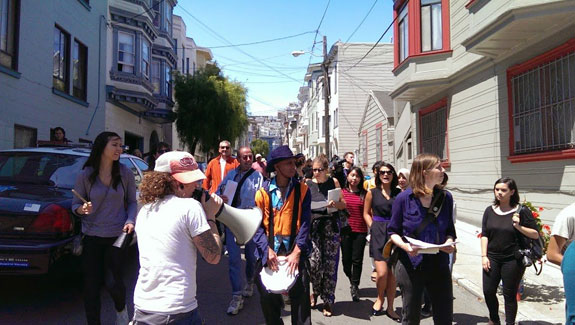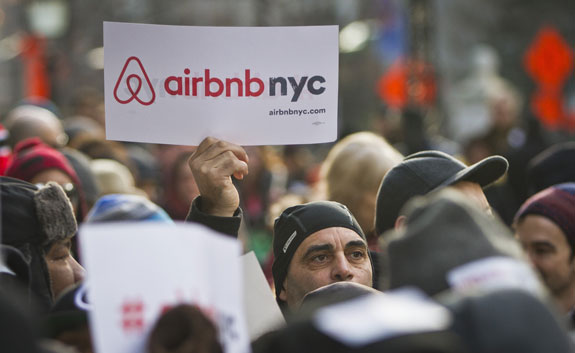Airbnb, the $25 billion global-hospitality behemoth, may have met its match. And right in its hometown of San Francisco.
On November 3, the voters of San Francisco will vote on Proposition F, the citizens initiative that, if passed, will crack down on Airbnb’s business. In the heart of Silicon Valley, a coalition of homeowners, neighborhood groups and tenant advocates gathered over 20,000 signatures to say “enough is enough.”
I have been an Airbnb host in San Francisco for about nine months. Last January I watched Katie Couric interview Airbnb’s 34-year-old billionaire CEO, Brian Chesky, and that’s when I realized that something didn’t add up.

Anti-Airbnb protestors in San Francisco’s North Beach neighborhood, in 2014. (Photo by Joey Cosco/Business Insider)
Testing Airbnb’s claims
Couric asked Chesky if his company inspects its hosts’ homes for safety and fire hazards. Chesky replied, “We want to be a gold standard,” saying that he has 100 employees devoted exclusively to safety and that “hosts verify their IDs by connecting to their social networks and scanning their official ID or confirming personal details.”
So to test Airbnb’s system, I signed up as a host. I took a few photos of my house, inside and out and uploaded them to the Airbnb website, and within 15 minutes my place was “live” as an Airbnb rental. No background check, no verifying my ID, no confirming my personal details, no questions asked. Not even any contact with a real human from their trust and safety team. Nothing.
I could have used photos of my neighbor’s house, or even photos saved from the website of Better Homes and Gardens. Within an hour, I had my first inquiry from a guest. Within a couple of months, I had over a dozen reservation requests that would have netted me at least $4,000 in short-term rental income. This had the makings of a seriously lucrative enterprise.
Indeed, an accidentally leaked memo from huge real-estate developer Coldwell Banker Commercial estimated that a landlord could more than double net annual income by renting to Airbnb tourists than to local residents.
I was impressed and appalled at how easy Airbnb’s website made it.
When Couric asked Chesky about fire safety, instead of outlining his company’s inspection procedures, he replied that Airbnb, a company valued at $25 billion, offers free smoke and carbon-monoxide detectors to its hosts. When Couric pushed a bit further, Chesky talked about their “self-administered” system.
“We want to make sure that the codes and regulations are modernized,” he said. “A lot of the laws are 20th-century laws, or sometimes even 19th-century laws, in the 21st century.”
I decided to take Chesky up on his “gold standard” offer of receiving a free and “self-administered” smoke and carbon-monoxide detector for my Airbnb home. I requested one via the Airbnb website, and my query received the briefest of e-mail responses, directing me to a particular Airbnb webpage. But on that page, instead of offering me a free detector, it offered me a free “Emergency Safety Card,” saying I could use it to “list emergency numbers, exit routes, and other resources” for my guests.
Apparently, the offer for a free smoke detector had expired faster than a Groupon coupon. But the Airbnb representative didn’t mention that, nor did Chesky in his interview with Couric.
Besides the hosts, Airbnb also has no quality control over the types of guests. Neighbors suddenly find themselves living next door to a “hotel” where complete strangers are traipsing in and out, keeping tourist hours, in close proximity to children, seniors, and other vulnerable populations. That’s true of regular hotels as well, but usually they exist in areas that have been zoned for such activity.

Supporters of Airbnb hold a rally outside City Hall January 20, in New York City. (Photo by AP Photo/Bebeto Matthews)
Who’s really renting their places out?
All of this revealed to me a “credibility gap” between the company’s public face and reality.
But the biggest gap of all is in how Airbnb portrays “regular people” hosts, those who rent out spare rooms to tourists to make some extra money in these difficult times, as the face of its company. What could be wrong with that?
Here’s what’s wrong: an increasing amount of Airbnb’s commercial activity in cities like New York, San Francisco, and Los Angeles does not come from the listings of “regular people” who are merely renting out a spare room. Instead, it comes from professional landlords who are removing badly needed housing from the local market and making it available exclusively for tourists. Many of these landlords are evicting thousands of people and getting rid of rent-controlled housing.
A 2014 investigation by Eric Schneiderman, New York state’s attorney general, found that nearly 40% of Airbnb’s $451 million in revenue, some $168 million in New York City alone, came from hosts who had at least three listings on the site. Data analyst Tom Slee plucked info from the Airbnb site in September and found that of the 30,268 listings in New York City, 44% of guest visits are to hosts with multiple properties. (Slee shared the latest information with the author via email. Here’s an example of earlier research along the same lines.)
These are not “regular New Yorkers” renting a spare room — not too many can afford to have control over multiple properties. They are professional operators who took on multiple leases in desirable locations.
One of those operators, Robert “Toshi” Chan, was revealed to be the Airbnb “host” of more than 200 apartments in dozens of different buildings, known collectively as Hotel Toshi. Eventually, Toshi’s illegal operation was shut down, and he agreed to pay a $1 million settlement for not obtaining proper hotel permits or insurance.
Under political pressure, last year Airbnb kicked off some of the worst violators, but recent data indicates little has changed. Its service is eating up affordable housing for local residents.
In San Francisco, various studies have found that a third of Airbnb rentals are controlled by people with two or more listings, and 40% of revenue comes from Airbnb hosts with multiple listings.
In Los Angeles, another study revealed that while a majority of hosts were “regular people,” those rentals generated just 11% of the company’s revenue. The other 89% was generated by professional landlords and agencies.
Perhaps the biggest tragedy in all this is that at the core of Airbnb is a really good idea. It has cleverly used Web- and app-based technology to bust open a global market that connects tourists with financially strapped homeowners. After interviewing some of Airbnb’s “regular-people” hosts, I’m convinced that this service legitimately does help them make ends meet.
But by taking such a hands-off, laissez-faire attitude toward the professionalization of hosting by greedy commercial landlords and multiproperty agents, Airbnb has become its own worst enemy. As the number of victims piles up, it undermines its own “sharing and trust” ethos because Airbnb could easily meet cities halfway:
- With one stroke of the computer mouse, Airbnb could “evict the evictors” — de-list from its website any professional landlords or property managers operating multiple properties as tourist hotels. It has the data and knows who they are.
- Cooperate with cities like San Francisco, Santa Monica, and Portland, which require hosts to register with local agencies, by de-listing any unregistered hosts.
- Pay the same hotel occupancy taxes that hotels pay in all 34,000 cities in which Airbnb operates, or collect them from the hosts and turn them over to the cities.
- Stop refusing to supply the data that cities need to enforce regulations and taxation, including the number of rental nights and rates charged by each host.
Whatever its remarkable origin as a rags-to-riches story that began in Brian Chesky’s living room, Airbnb is no longer simply a platform of “regular people” hosts. Instead, it has morphed into a giant loophole for professional real-estate operatives, allowing them to evade long-standing city laws that previously had protected the local housing stock by banning short-term rentals to tourists. The fast-growing company and its politically connected investors have shown no interest in killing their golden goose.
So some of the citizens of San Francisco have taken the matter into their own hands. Airbnb is clearly panicked — it is spending over $8 million to defeat the ballot measure, while the neighborhood activists can’t hope to match that. It’s David vs. Goliath in San Francisco. So goes the “sharing” economy.
